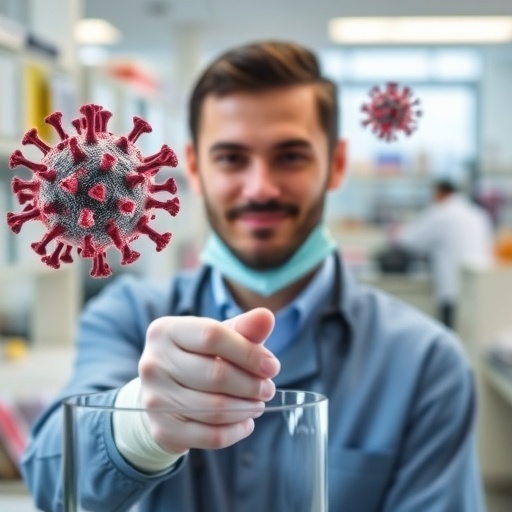In a groundbreaking development poised to transform the landscape of infectious disease treatment, a team of researchers from Monash University and The Alfred Hospital has engineered a tailored bacteriophage therapy product aimed at combating antimicrobial-resistant pathogens. This pioneering treatment, called Entelli-02, is an innovative cocktail composed of five distinct bacteriophages explicitly designed to target and eliminate the Enterobacter cloacae complex (ECC), a notoriously resilient group of bacteria that pose significant clinical challenges worldwide.
The Enterobacter cloacae complex is a cluster of opportunistic Gram-negative bacteria frequently implicated in severe hospital-acquired infections. These pathogens have emerged as a formidable threat due to their alarming capacity to develop resistance against a broad spectrum of antibiotics, including last-resort agents. Globally, infections caused by Enterobacter species were attributed to over 200,000 fatalities in 2019 alone, underscoring the urgent need for novel treatment modalities.
Entelli-02’s conception represents a synergy between cutting-edge microbiology, genetic engineering, and clinical application. Over the course of a decade, the research team curated an extensive repository of bacterial isolates, which formed the substrate for isolating potent bacteriophages that could infect and lyse the target bacteria. The iterative process involved isolating candidate phages, genetically adapting them to broaden their host range, and rigorously testing their efficacy in preclinical models, culminating in the formulation of a five-phage cocktail capable of robust antibacterial activity.
Unlike conventional broad-spectrum antibiotics that indiscriminately eradicate both pathogenic and commensal bacteria, phage therapy offers unparalleled precision by exploiting the natural predatory relationship between bacteriophages and their bacterial hosts. This specificity not only minimizes collateral damage to the host microbiota but also mitigates the evolutionary pressures that typically drive antibiotic resistance. The genetically tailored phages in Entelli-02 have been optimized to enhance infectivity and lytic potency against a diverse panel of ECC isolates.
Entelli-02’s therapeutic utility was stringently validated in preclinical murine infection models, where treatment resulted in over a 99% reduction in bacterial load. These promising outcomes underscore the cocktail’s potential efficacy and its capacity to be integrated into frontline clinical settings. The therapeutic-grade preparation of Entelli-02 was produced at the Monash Phage Foundry, meeting the rigorous sterility and safety criteria mandated by Australia’s Therapeutic Goods Administration under the Special Access Scheme for intravenous applications.
Professor Jeremy J. Barr, leading the study from Monash University, emphasized the clinical readiness of Entelli-02, stating that this bespoke phage cocktail is not only a scientific milestone but also a practical tool to be deployed against lethal, drug-resistant infections in real-world hospital environments. This initiative pioneers precision medicine in infectious diseases by providing a hospital-specific treatment option tailored to local AMR epidemiology.
Professor Anton Peleg, co-senior author and infectious disease expert, highlighted the transformative nature of this research. By bridging the gap between broad-spectrum antibiotic therapy and phage personalization, the team created a scalable, off-the-shelf therapeutic that offers rapid deployment capabilities. This innovation addresses a critical bottleneck in phage therapy development: the ability to provide immediate, reliable treatment without the delay of patient-specific phage isolation and characterization.
The research collaboration brought together experts from Monash University’s Centre to Impact AMR, The Alfred’s Department of Infectious Diseases, and the Monash Biomedicine Discovery Institute. Among the key contributors, Dr. Dinesh Subedi played a pivotal role in the isolation, genetic adaptation, and refinement of the phage cocktail, implementing rigorous experimental protocols to optimize therapeutic outcomes.
Entelli-02’s availability under compassionate use status marks a critical milestone, offering hope to patients suffering from untreatable ECC infections. This model of hospital-specific phage therapy paves the way for future clinical trials and wider application, setting a template for other healthcare institutions grappling with antimicrobial resistance crises to develop tailored phage therapeutics.
The underlying science of bacteriophage therapy harnesses viral agents that naturally prey on bacteria. Phages bind to specific receptors on bacterial surfaces, inject their genetic material, replicate within the host, and culminate their life cycle by lysing the bacterial cell, releasing progeny phages to continue the infection cycle. This self-amplifying mechanism confers several advantages over static antibiotic dosing, including the capability to adapt dynamically alongside bacterial resistance profiles.
The iterative design strategy employed by the Monash team exemplifies rational phage cocktail engineering. Initially starting with three phages, the researchers leveraged genetic adaptation techniques to broaden host specificity and subsequently incorporated two additional optimized phages. This approach enhanced the breadth of bacterial strains targeted, increased treatment efficacy, and reduced the potential for phage resistance emergence.
Entering the clinical arena, the manufacturing of Entelli-02 adhered to stringent quality control protocols to ensure intravenous safety and effectiveness. The Monash Phage Foundry synthesized the phage cocktail in therapeutic-grade formulations, setting a precedent for the scalable production of hospital-specific phage products under stringent regulatory frameworks. This capability is critical for transitioning phage therapy from experimental stages to widespread clinical practice.
Antimicrobial resistance has been identified by the World Health Organization as one of the leading threats to global health, food security, and development. Innovative treatments like Entelli-02 represent a paradigm shift in managing resistant infections by leveraging biological therapies that complement or even supplant failing antibiotics. The successful rational design and deployment of this phage cocktail could catalyze a new era in infectious disease therapeutics.
This landmark achievement not only exemplifies how interdisciplinary collaboration can tackle urgent medical challenges but also reinforces the necessity of integrating molecular biology, genomics, pharmacology, and clinical expertise to address the evolving infectious disease landscape. As Entelli-02 moves towards broader clinical application, it holds promise as a scalable, precision medicine tool poised to reshape antimicrobial stewardship and patient outcomes worldwide.
Subject of Research: People
Article Title: Rational design of a hospital-specific phage cocktail to treat Enterobacter cloacae complex infections
News Publication Date: 24-Sep-2025
Web References:
https://www.nature.com/articles/s41564-025-02130-4
References:
DOI: 10.1038/s41564-025-02130-4
Keywords: Clinical medicine, Diseases and disorders




